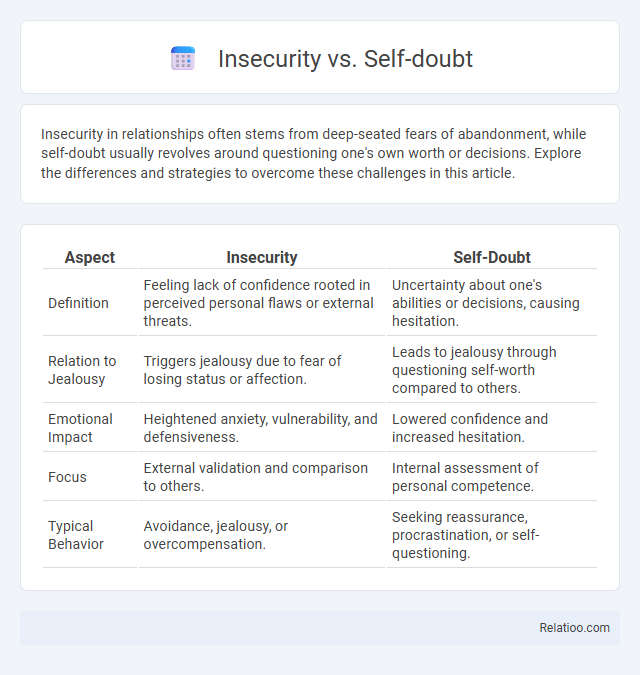Insecurity in relationships often stems from deep-seated fears of abandonment, while self-doubt usually revolves around questioning one's own worth or decisions. Explore the differences and strategies to overcome these challenges in this article.
Table of Comparison
| Aspect | Insecurity | Self-Doubt |
|---|---|---|
| Definition | Feeling lack of confidence rooted in perceived personal flaws or external threats. | Uncertainty about one's abilities or decisions, causing hesitation. |
| Relation to Jealousy | Triggers jealousy due to fear of losing status or affection. | Leads to jealousy through questioning self-worth compared to others. |
| Emotional Impact | Heightened anxiety, vulnerability, and defensiveness. | Lowered confidence and increased hesitation. |
| Focus | External validation and comparison to others. | Internal assessment of personal competence. |
| Typical Behavior | Avoidance, jealousy, or overcompensation. | Seeking reassurance, procrastination, or self-questioning. |
Understanding Insecurity and Self-Doubt
Insecurity manifests as a pervasive feeling of inadequacy that impacts self-esteem and confidence, often rooted in past experiences or external validation. Self-doubt specifically refers to uncertainty about one's abilities or decisions, creating moments of hesitation rather than a constant state of unease. Understanding these distinctions helps in developing targeted strategies for overcoming negative self-perceptions and fostering resilience.
Key Differences Between Insecurity and Self-Doubt
Insecurity involves a deep-rooted feeling of unworthiness or fear of rejection that often affects multiple aspects of a person's life, while self-doubt refers to uncertainty specifically about one's abilities or decisions in particular situations. Insecurity tends to be more pervasive and persistent, influencing overall self-esteem, whereas self-doubt is usually temporary and situation-specific, allowing for growth and learning. Understanding these key differences helps in addressing the underlying causes and developing targeted strategies for improving confidence and mental well-being.
Root Causes of Insecurity
Insecurity often stems from deep-rooted fears of judgment, childhood experiences, or unresolved trauma that undermine self-worth, whereas self-doubt typically arises from specific situations or tasks challenging confidence. The root causes of insecurity include negative early attachments, persistent criticism, and societal pressures that create an internalized sense of inadequacy. Understanding these distinctions clarifies that insecurity is a pervasive, foundational issue, while self-doubt tends to be temporary and context-specific.
Common Triggers of Self-Doubt
Common triggers of self-doubt include negative past experiences, fear of failure, and unrealistic comparisons to others that undermine your confidence. External criticism and high personal expectations often intensify these feelings, causing hesitation in decision-making. Recognizing these triggers helps you develop strategies to overcome self-doubt and build a stronger sense of self-worth.
Emotional Impact of Insecurity vs Self-Doubt
Insecurity often generates intense emotional turmoil by undermining Your self-worth and triggering chronic anxiety, whereas self-doubt primarily causes temporary hesitation or uncertainty in decision-making. The emotional impact of insecurity tends to be deeper and more pervasive, leading to feelings of inadequacy and vulnerability that may affect relationships and mental health. Self-doubt, while uncomfortable, can be a catalyst for growth when managed effectively, distinguishing it from the more debilitating effects of insecurity.
How Insecurity Affects Relationships
Insecurity, distinct from self-doubt, profoundly impacts relationships by fostering mistrust, jealousy, and emotional distance. While self-doubt involves questioning one's abilities, insecurity reflects a deeper fear of rejection and unworthiness, often leading to clinginess or withdrawal. These behaviors strain communication and intimacy, undermining the foundation of connection between partners.
Overcoming Self-Doubt: Practical Strategies
Overcoming self-doubt requires identifying negative thought patterns and replacing them with positive affirmations that build confidence. You can practice setting small, achievable goals to gradually reinforce your belief in your abilities and track your progress. Incorporating mindfulness techniques and seeking constructive feedback from trusted sources also help strengthen your self-assurance and reduce insecurities.
Building Confidence: From Insecurity to Self-Assurance
Insecurity often stems from deep-rooted fears and self-doubt arises from questioning your abilities in specific situations, both hindering confidence-building. Addressing these challenges requires targeted strategies like positive self-talk, skill development, and setting achievable goals to transform uncertainty into self-assurance. By consistently practicing these methods, you can replace insecurity with confidence and foster lasting self-belief.
Mindfulness Techniques to Combat Negative Thoughts
Insecurity, self-doubt, and anxiety often stem from negative thought patterns that undermine your confidence and clarity. Mindfulness techniques such as focused breathing, meditation, and non-judgmental awareness help you observe these thoughts without attachment, reducing their impact over time. Consistent practice empowers you to replace self-critical narratives with compassionate understanding, fostering mental resilience and emotional balance.
Seeking Support: When to Ask for Help
Recognizing the difference between insecurity, self-doubt, and low self-esteem is crucial when deciding to seek support, as insecurity often stems from fear of judgment, while self-doubt arises from uncertainty in one's abilities. Seeking help from trusted friends, mentors, or mental health professionals can provide clarity, boost confidence, and offer strategies to overcome persistent negative thoughts. Early intervention in addressing these feelings promotes emotional resilience and prevents escalation into anxiety or depression.

Infographic: Insecurity vs Self-doubt
 relatioo.com
relatioo.com